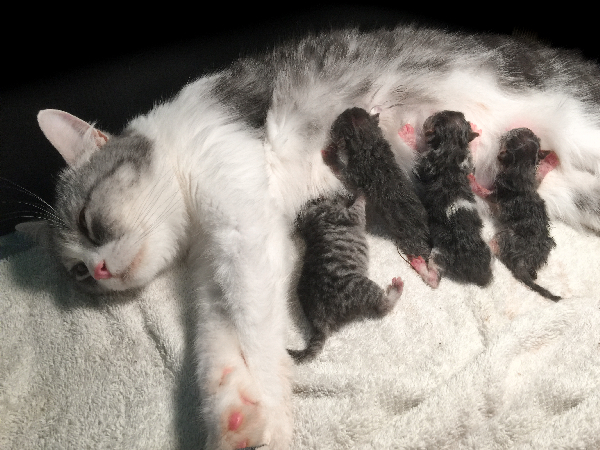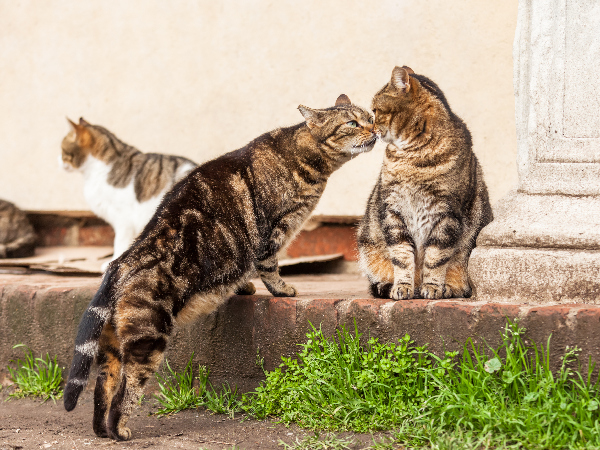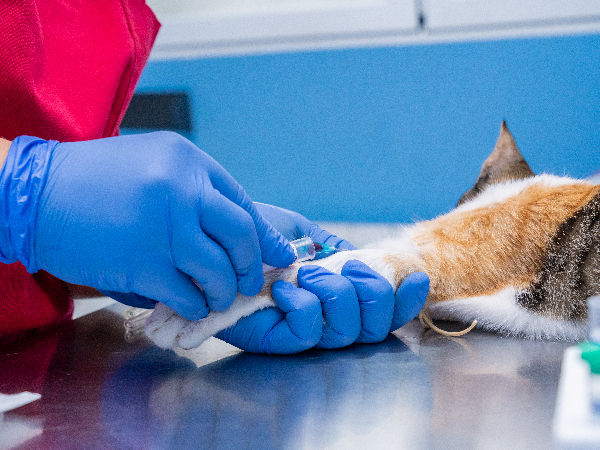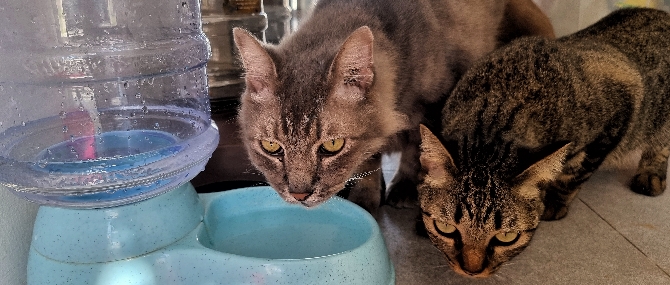Feline infectious enteritis: symptoms, treatment, and prevention
Feline infectious enteritis (FIE), or feline panleukopenia, is a highly contagious viral disease that causes severe diarrhoea and vomiting in cats. It is mainly spread through direct contact with infected poo, but can also survive on clothes, bedding and food bowls. It is sometimes called feline distemper, and vaccination is the best way to prevent your cat from getting the infection.
Brief summary
- Feline panleukopenia is a viral disease that mainly affects unvaccinated kittens and cats
- It is caused by the feline parvovirus
- Symptoms include vomiting, diarrhoea, dehydration and lethargy
- The virus can be prevented with your cat’s complete course of vaccinations
What is feline infectious enteritis?
It is a contagious viral infection that affects kittens and cats. It attacks the lining of the intestines and causes severe bloody diarrhoea and vomiting, leading to severe dehydration. It also attacks the white blood cells via the cat's bone marrow and lymph glands, which your cat needs to be able to fight off the infection. It is an extremely dangerous infection, often causing death in young and unvaccinated cats..
Is it called anything else?
You may also hear it referred to as feline panleukopenia because it attacks and destroys the body's white blood cells, which support a strong and healthy immune system. It's also called feline parvoviral enteritis after the parvovirus infection that causes the first symptoms.
What are the signs and symptoms of parvovirus in cats?
Feline infectious enteritis mostly causes severe vomiting and diarrhoea, which is why it's also known as feline parvovirus. Unfortunately, many cats die rapidly without showing any symptoms. Signs to look out for include:
If a pregnant cat is infected, the parvovirus can affect the developing brains of the unborn kittens. These kittens are then born with a condition called cerebellar hypoplasia and have a marked lack of balance and difficulty in walking when they are old enough to start moving.

Because the infection can spread so rapidly and causes such widespread damage, kittens and unvaccinated cats can often die before symptoms show.
How does feline infectious enteritis spread?
Parvovirus in cats is spread in two ways, known as direct and indirect contamination.
Direct contamination is where the infection is spread directly through touching or sniffing infected cat poo. Cats infected with parvovirus can continue to pass the virus for over six weeks after infection.
It can also be transmitted through what's known as indirect contamination. This is where the cat touches bedding, food and water bowls, and grooming equipment contaminated with the virus. Because of this, you must visit the breeder or rescue centre where you plan to get your kitten to ensure the cats are clean and well cared for and have their own bedding and food bowls at home. This will significantly reduce the chance of bringing any infected belongings home.

Because the virus is hard to kill, it can live on surfaces for more than a year at room temperature and travel long distances on clothing and shoes. For example, it can go from the rescue centre or breeder to your home on your clothes or shoes. It can also survive in the poo of an infected cat for six weeks, making treating the cat and killing the virus very difficult.
What cats are vulnerable to feline panleukopenia?
Any young kitten or cat who doesn't have a strong immune system is at risk of parvovirus. Kittens under five months are most at risk as they can easily become infected before finishing their first course of vaccinations. Other cats that may be at higher risk are those who haven't kept up to date with their infections or have illnesses like cancer, which means their immune system doesn't work as well as it should.
Have any studies into feline panleukopenia been carried out?
Several studies have been carried out into this disease. One looked at outbreaks and risk factors in cats in animal shelters and it concluded that vaccines (even more than husbandry and hygiene management) were the most effective way of ensuring cats living in groups did not catch or spread panleukopenia.
In another study looking at the prognosis of cats diagnosed with feline panleukopenia, researchers found that it has a high mortality rate and that only vaccinating kittens up to 12 weeks of age may not be adequate to prevent the disease.
Cats who join Pet Health Club are given a vet-prescribed vaccination against feline panleukopenia.
Why does feline infectious enteritis have a high mortality rate?
Feline parvovirus is so dangerous because of what it does to the body and its rapid method of action. Infectious enteritis stops the bone marrow from making white blood cells, which are essential to a healthy immune system. Without a strong immune system, your kitten cannot fight the infection.
Once these infected cells reach the intestines, they cause diarrhoea and vomiting and cause your cat to lose their appetite before making them extremely dehydrated. The barrier between the intestines and the rest of the body begins to break down, which means other secondary infections happen, making your cat even more ill. Even with antibiotics and fluids to help them hydrate, the speed at which the virus can spread means recovery is unlikely.
Many kittens infected with the virus may die before they even show symptoms.
When should I visit my vet?
If you believe your cat shows any signs of panleukopenia, call your vet immediately and tell them what you suspect. Your vet will then create an isolated room or area for your cat to be diagnosed and treated. Calling first is vital because of how easily the virus is spread. By letting them know you're coming, they can ensure no other cats in the surgery will be infected.
How is feline infectious enteritis diagnosed?
If your vet feels your cat might have parvovirus, they will do a blood test and take some poo samples. With these, they can look for specific signs of the infection. One of these signs is a low white blood cell count. Unfortunately, because the infection spreads so quickly and is so aggressive, many cats die before being diagnosed.

Your vet will also look at your cat's medical history and lifestyle to see if they have a higher chance of getting the virus. Diagnosing this disease quickly is important if your cat is to have any chance of recovery. However, this can be challenging because many symptoms are signs of less dangerous and more common feline illnesses.
How is feline infectious enteritis treated?
There is no specific treatment for feline parvovirus, as each case can have different symptoms requiring different treatments. This is because vets will try to treat the symptoms of the virus to help your cat get better.
However, suppose your cat starts showing any symptoms we've mentioned. In that case, you should isolate them immediately to stop the spread to other cats in the household and clean all shared areas with a suitable disinfectant. Because cats with parvovirus often die from dehydration or secondary infections, treatment with fluids, anti-nausea medication and antibiotics is vital.
What are the long-term effects of feline panleukopenia?
If your cat beats the virus, they are unlikely to be at risk of the disease again. However, the gastrointestinal tract (mouth, throat, stomach, intestines) may have been so badly damaged they can't recover completely.
Sometimes, the cat may struggle to get everything they need from their food, so they can't put on weight. Other long-term effects can be diarrhoea. These long-term issues can be managed but will need lifetime medication and constant care.
Feline infectious enteritis prevention
Even though the mortality rate of feline parvovirus is high, there are ways to prevent your kitten from catching it in the first place.
As with most things, prevention is better than cure, so vaccinating your cat is the most important thing you can do. Your vet will offer your kitten routine vaccines for four major infections; cat flu (feline herpesvirus and feline calicivirus) feline enteritis and feline leukaemia virus.
The vaccines will be given as part of the primary course of vaccinations which your kitten will receive at around eight weeks, and then again three to four weeks later. If your cat is older and hasn’t been vaccinated, they can start their primary course again.
Members of Pet Health Club will receive these vaccinations, plus the boosters, as a part of their plan, ensuring their cat is fully protected throughout their life.
Need more info?
For expert advice on microchipping your cat, get in touch with your local vet.
Find your nearest vet using our Find a Vet page, or speak to a vet online using Online Vets.




